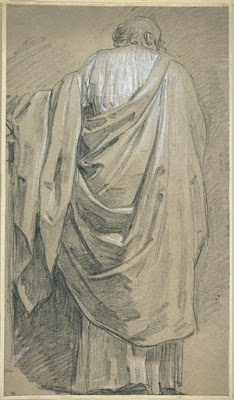 |
| Jean-Baptiste-Henri Deshays Drapery Study before 1765 drawing Musée du Louvre |
 |
| Pier Leone Ghezzi Drapery Study before 1755 drawing Musée du Louvre |
 |
| Louis-Joseph Le Lorrain Drapery Study before 1759 drawing Musée du Louvre |
 |
| Nicolas-Bernard Lépicié Drapery Study of Sleeve before 1784 drawing Musée du Louvre |
 |
| Nicolas-Bernard Lépicié Drapery Studies ca. 1783 drawing Musée du Louvre |
 |
| Nicolas-Bernard Lépicié Drapery Study ca. 1783 drawing Musée du Louvre |
 |
| Pierre Subleyras Study of Seated Draped Model before 1749 drawing Musée du Louvre |
 |
| Pierre Subleyras Study of Seated Draped Model before 1749 drawing Musée du Louvre |
 |
| Pierre Subleyras Study of Seated Draped Model before 1749 drawing Musée du Louvre |
 |
| Giambattista Tiepolo Drapery Study - Man wearing a Cloak 1752 drawing Graphische Sammlung, Staatsgalerie Stuttgart |
 |
| Louis-Claude Vassé Study of Four Draped Figures before 1772 drawing Musée du Louvre |
 |
| Anonymous French Artist Studies of Draped Man leaning over Parapet 18th century drawing Musée du Louvre |
 |
| Jean-Joseph Taillasson Study of Draped Elder before 1809 drawing Musée du Louvre |
 |
| Jean-Joseph Taillasson Study of Draped Youth before 1809 drawing Musée du Louvre |
 |
| Pierre Puvis de Chavannes Drapery Study ca. 1856 drawing Musée d'Orsay, Paris |
"Let us then examine the draperies of the great masters in these arts: how, for instance, they use to clothe a matron, or a man of rank. Cast an eye on those figures (said he, pointing to some prints after Raphael and Guido, that hung upon the wall): what appearance to you think an English courtier or magistrate, with his Gothic, succinct, plaited garment, and his full-bottomed wig; or one of our ladies in her unnatural dress, pinched and stiffened and enlarged, with hoops and whalebone and buckram, must make, among those figures so decently clad in draperies that fall into such a variety of natural, easy, and ample folds, that cover the body without encumbering it, and adorn without altering the shape?"
– George Berkeley, from Alciphron, or, The Minute Philosopher (1732)